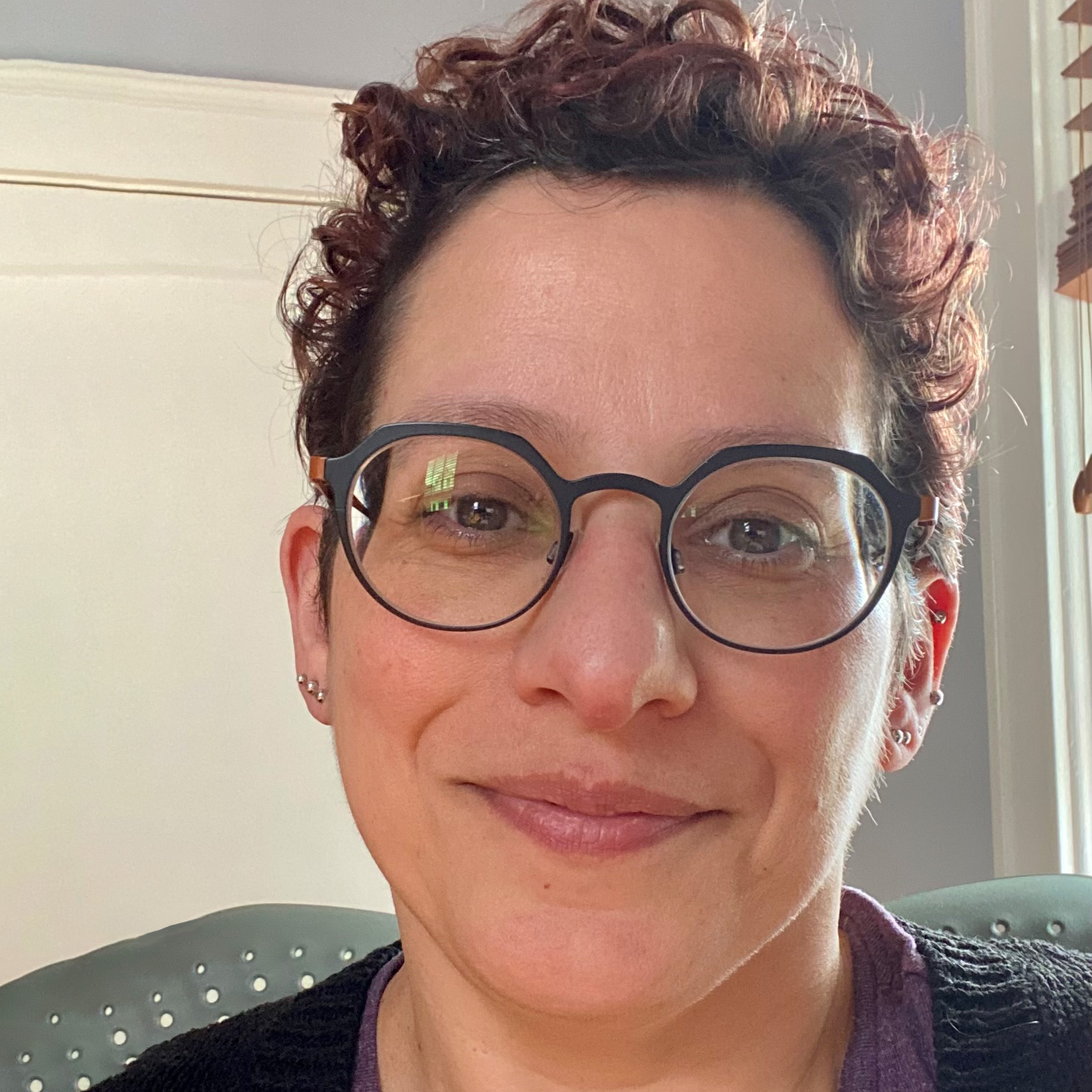Undergraduate Resources

EAPS Academic Resources
Undergraduate Forms
- Senior Thesis Proposal Form
- Undergraduate Substitutions Petition
Petition for changes to a bachelor’s course of study.
We’re here to support every aspect of EAPS academic programming and are an important part of our students’ support network, helping to connect you with resources and opportunities.
Prospective students, if you have a question about academic life at MIT, or want to arrange a visit, please don’t hesitate to reach out!
Note: While the 9th floor undergoes renovations, please email the EAPS Education Office to connect.

Ann Greaney-Williams
Assistant Director of Academic Programs
Phone: 617-253-3380
Email: agreaney@mit.edu
Co-chair of the EAPS Committee on the Education Program and responsible for administrating Course 12 undergraduate and graduate programming. Advises students regarding degree requirements, career options, funding, policies and procedures, and Institute resources for student support.

Alana Snelson
Senior Academic Program Assistant
Phone: 617-253-3381
Email: asnelson@mit.edu
Provides administrative support for the EAPS Education Office, including room scheduling, classrooms and supplies, reimbursements, Canvas sites, student appointments, and various forms, including grading and evaluations, registration, and thesis submissions.

Alejandro Paz
EAPS Liaison, MIT Libraries
Room: 14S-203
Email: apaz@mit.edu
Alejandro specializes in information and resources related to Earth, Atmospheric, and Planetary Sciences (EAPS), and other climate and energy subject areas. If you need help finding research for your thesis or other projects, be sure to reach out to him. He can also put you in touch with other expert librarians.
Visit libraries.mit.edu for information about library services, including:
- Search MIT Libraries’ print and online collections
- Borrowing and requesting materials
- Data and GIS services
- Scholarly publishing and copyright
Check out MIT Libraries’ research guides on EAPS-related subjects:
Undergraduate Thesis Requirements + Procedures
- A Senior Thesis is a requirement of the EAPS major and should have strong experimental, computational, theoretical, or fieldwork content. The thesis should state the problem, summarize previous knowledge, indicate findings, and the significance of the findings.
- Your Senior Thesis Proposal form should be submitted to the EAPS Education Office by the Add Date of the term prior to the term in which the thesis will be submitted (e.g. if you will submit the thesis in the spring semester, the form must be submitted in the fall semester), even if you are not registered for 12.THU or 12.TIP that semester.
- You will register for 12.TIP, a thesis preparation course, in the semester before you submit your thesis, and 12.THU, in the semester you submit it.
- Any EAPS faculty member or research staff person is an acceptable thesis supervisor.
- Thesis proposals may detail work that will be conducted outside of EAPS (with a research supervisor in another department) but must have an EAPS Thesis Supervisor.
- Research toward a thesis carried out prior to 12.THU and 12.TIP can be conducted for credit under 12.UR, 12.URG, or as “UROP for Pay.” Students enrolled in 12.THU may not simultaneously enroll in 12.UR or 12.URG in the same semester and may not receive financial support that semester through the UROP program for a project related to their thesis research.
- If you are submitting a joint thesis for two departments, an EAPS faculty member or research staff person must be a co-advisor on the thesis.
- Your thesis advisor will read your thesis and determine a letter grade.
- Senior Theses are due in the EAPS Education Office by the deadline set on the academic calendar. You need to submit one digital copy of your thesis with original signatures from yourself and your thesis advisor. They will then be signed by the EAPS Undergraduate Officer. Please also submit a matching digital copy without signatures, if submitting your thesis to the library.
MIT Formatting for Theses
The MIT thesis FAQs, specifications, and checklists are posted on the MIT Library website. You are responsible for making certain that your thesis is formatted properly and submitted in a timely fashion. Once you submit your final thesis to the Education Office you can not make any changes to it or swap out pages.
Thesis Signatures
- You are responsible for acquiring signatures from your advisor and the Undergraduate Officer.
- Please set up your thesis to accept cover sheet signatures through DocuSign via IS&T (Kerberos required). If you have questions, please reference our illustrated guide or contact the EAPS Education Office.
- Turn in a second copy of your thesis with a blank cover sheet (i.e. do not sign your name on the thesis). The MIT Library requires an unsigned copy.
- Office Space Exit Checklist — when vacating offices on the MIT campus
- EAPS Exit Survey — a copy will be emailed to you
General MIT Student Resources
The current edition of The Mind and Hand Book is the official guide to MIT’s expectations of all undergraduate and graduate students and also includes a number of useful resources.
We have also included some specific links here that relate to common student needs.
- Division of Student Life
Provides a full range of services to help our community of students thrive intellectually, physically, spiritually, and personally, including housing, dining, activities, and wellness. - Registrar’s Office
Manages enrollment, registration, graduation, and all other aspects of student academic records. This also includes the academic calendar and enrollment certifications. - Disability and Access Services (DAS)
Enables an accessible campus experience at MIT by ensuring access for qualified students with disabilities and consulting on digital accessibility, assistive technology, and user experience. - MIT International Scholars Office
Provides advising on immigration regulations, aids in the maintenance of legal status, and assists international scholars in their transition to life in the United States at MIT. - Student Financial Services
Provides financial aid, collects payments, coordinates jobs, and advises on financial literacy. They also provide information geared towards graduate students, as well as helpful information about viewing and paying your bill. - Academic Integrity at MIT
Student handbook on academic honesty and collaboration.
Just for Undergrads
- Undergraduate Advising Center
MIT’s academic advising hub for undergraduate students and advisors. - Committee on Academic Performance
The faculty Committee on Academic Performance (CAP) reviews the academic performance of all undergraduates at the end of the Fall and Spring terms, and also hears petitions from students making requests for exceptions to established academic standards. - MIT Undergraduate Association
As the undergraduate student governing body at the Institute, the goals of the UA include articulating students’ concerns, communicating student opinion to Institute administration, and organizing undergraduate events and activities. - Undergrad Student Support Services (S3)
A friendly and easily accessible support hub for undergraduate students. Whether you’re struggling with a PSET due to personal issues, feeling too sick to take an exam, considering taking time away from the Institute, or just aren’t sure who to talk to, we can help. - Office of Academic Community, Empowerment, and Success
OACES (pronounced “oasis”) supports the success of students who have faced challenges on their paths to, and through, MIT — including but not limited to students who are first-generation, low-income, transfer, underrepresented, or underserved. Open to all students, OACES is committed to fostering academic excellence; personal and professional growth; and strong, connected communities that empower students to thrive as leaders in academia, industry, and society.
Community Resources
- Career Advising and Professional Development (CAPD)
Career guidance, events, training, and one-on-one appointments. - MIT Writing & Communication Center (WCC)
Schedule one-on-one consulting sessions with professional writers. The Center provides free professional advice about all types of writing and speaking/oral presentations. Specialized help is available to non-native English speakers. - The Atlas Learning Center
Online sessions on technical topics, “soft” skill topics (such as leadership, communication, management, and career transitions), and required MIT training modules. - MIT Open Learning
Access MIT course content online, including OpenCourseWare (OCW) and MITx. - MIT Teaching and Learning Laboratory (TLL)
Explore TLL’s programs and services, including workshops, seminars, and consultations related to teaching and learning. The Kaufman Teaching Certificate Program is offered twice a year at no charge to MIT postdocs and graduate students who wish to develop their teaching skills. It is very popular, and sessions typically fill immediately after registration opens.
EAPS REFS – Resources for Easing Friction and Stress
We are a support network of graduate student mediators (REFS) who have completed extensive training with Conflict Management@MIT to provide low barrier, confidential peer-to-peer coaching, listening, de-escalation, and informal mentoring and mediation. This means that if you have a problem — big or small, in lab or at home — we are prepared to listen and talk through possible solutions, all in a strictly confidential manner. If you need more support, we can direct you to one of the many additional resources available on the MIT campus.
As REFS, our mission is to help our peers deal with difficult situations and increase the overall well-being of all members within the EAPS community. Primary emphasis is on graduate student support, but we are also available to undergraduates, post-doctoral researchers, faculty, and staff in EAPS.
MIT Ombuds Office
The MIT Ombuds Office is a confidential* and independent resource for all members of the MIT community, including students, faculty, employees, alumni, and employees of Lincoln Lab, to constructively manage concerns and conflicts related to your experience at MIT. They support your success in work and studies by helping you to analyze concerns, clarify policies and procedures, and identify options to constructively manage conflicts. They also provide systemic feedback to strengthen MIT and promote a fair and respectful culture.
*The only exceptions to this pledge of confidentiality are situations that present a risk of serious and immediate harm to yourself or others.
MIT Office of Religious, Spiritual, and Ethical Life
Comprised of over 20 chaplains and 40 student groups, the Office of Religious, Spiritual, and Ethical Life (ORSEL) reflects the diversity of the institute’s community. Through regular opportunities for worship, meditation, prayer, and study, the office is a resource for students, faculty, and staff, of all faith traditions and belief systems. The chaplains provide religious, spiritual, and educational programming, as well as confidential* counseling and crisis support.
*Chaplains who are ordained clergy within their religious traditions are confidential resources for members of the community.
Institute Discrimination & Harassment Response (IDHR) Office
Contact the Institute Discrimination & Harassment Response (IDHR) Office for more information about resources and reporting options for bias incidences related but not limited to race, religion, sexual orientation, disability, and gender, including sexual harassment and sexual assault.
Violence Prevention & Response (VPR)
VPR is MIT’s primary, on-campus resource for preventing and responding to interpersonal violence, including sexual assault, dating and domestic violence, stalking, and sexual harassment. Their prevention specialists work with the entire campus to educate and raise awareness. Their hotline is available 24 hours a day to support survivors in deciding what to do next. All of their services are free and confidential.
Dean On-Call
The Dean on Call—a Residential Education staff member in the Division of Student Life (DSL)—is available to support students with urgent, non-academic concerns on nights, weekends, and holidays. The Dean on Call can be reached by contacting the MIT Police line and requesting a callback from the Dean on Call.
Weekdays 5PM–9AM | Weekends 24 hours
(617) 253-1212 or 100 from Campus Phones
MIT Health
At MIT Health, approximately 300 clinicians and other professionals provide clinical care, wellness programs, public health resources, student insurance services, and community support for the MIT community, including students, faculty, and staff, including families and retirees.
MIT Health is located in Building E23 — 617-253-4481
MIT Health’s Urgent Care Service is open daily for urgent, but non-life-threatening emergencies. (617-253-1311, 24-hour assistance at 617-253-4481).
Thrive@MIT is a good resource for general community wellness resources on campus.
Student Mental Health + Counseling
MIT Medical’s Student Mental Health and Counseling Services works with students to identify, understand, and solve problems, and to help transform that understanding into positive action. MIT Mental Health is available to anyone in the MIT community with problems, questions, or concerns.
Student Mental Health and Counseling Services is available for telehealth visits (if you are physically in Massachusetts only) and in-person appointments.
To make an appointment, call 617-253-2916 during regular weekday hours.
Mental health clinicians are available 24-hours a day for urgent matters — please call 617-253-2916 for assistance.
DoingWell
DoingWell was developed to empower students to prioritize their wellbeing. DoingWell means getting support whenever you feel like you could use some. During challenging times, it’s important to take care of yourself.
Undergrad Student Support Services (S3)
A friendly and easily accessible support hub for undergraduate students. Whether you’re struggling with a PSET due to personal issues, feeling too sick to take an exam, considering taking time away from the Institute, or just aren’t sure who to talk to, we can help.
GradSupport
Staff in the Office of Graduate Education provide advice and counsel on a variety of issues including faculty/student relationships, changing your advisor, conflict negotiation, funding, academic progress, interpersonal concerns, and a student’s rights and responsibilities.
Employee Mental Health + Counseling
MIT cares about the well-being of its community members. Employees or their family members seeking behavioral or mental health services can find a wide range of resources at the HR WorkLife Center site.
MIT HR WorkLife and WellBeing Center
The MIT Human Resources Center for WorkLife and WellBeing is committed to meeting the personal and professional needs of faculty, staff, postdocs, graduate students, and their families. We offer a wide range of programs and services to enhance your quality of life, both at home and at work.
MyLife Services
MyLife Services provides MIT faculty, staff, postdocs – and household members – 24/7 access to a network of experts who are available to help with life concerns. Consultations are available by telephone, video, or text-message.
MIT Office of Graduate Education Family Support
Helping student families navigate the MIT community and connect to resources and services, including step-by-step instructions and information about family-friendly and family-specific programming.
MIT Graduate Assistance and Information Network (GAIN)
24/7 confidential service for graduate students and their adult household members. One call puts you in touch with work-life experts who can provide personalized resources and referrals for legal and financial consultations, child care and elder care, relocation guidance, nutrition counseling, career assessment, and other life concerns like home repair, pet care, fitness programs, and more. MIT GAIN is also available to MIT’s undergraduate veterans.
Child Care + Parenting Resources for Employees
The MIT Work-Life Center offers a comprehensive network of resources to assist staff, faculty, and postdocs in finding or using child care services for children of all ages, as well as an internationally recognized program of parenting resources to support those in the community who are raising children, including biological and adoptive parents, step-parents, guardians, grandparents, extended family, foster parents, and others responsible for children’s care.
Adult + Senior Care Resources for Employees
The MIT Work-Life Center offers comprehensive support services for caregivers — our goal being to provide you with solutions to your caregiving challenges, so that you can focus on what matters most: being there for your loved ones.

